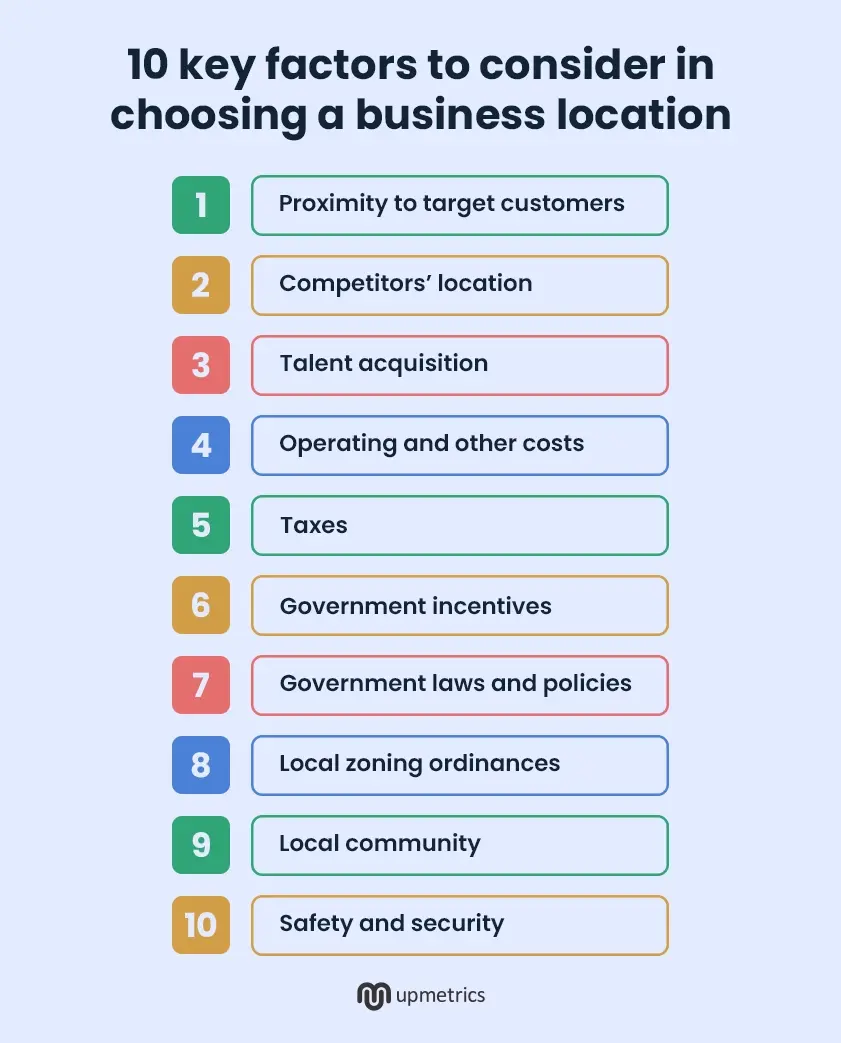Choosing a business location is one of the key decisions you’ll make as an entrepreneur. Doing so shouldn’t be based on a personal whim but rather on a detailed understanding of your needs and limits. To do this, you need to understand how you can choose the right location.
In this article, we’ll see how to pick the right location for your business, and the factors that influence your decision.
What is a business location strategy?
A business location strategy is a well-devised action plan to help you find the best location for your business. It guides you to find a location that aligns with the business’s goals and objectives.
A location strategy assesses factors such as market accessibility, operational costs, competition, customer demographics, supply chain logistics, and growth potential to help you make an informed location choice. By addressing these factors, a location strategy aims to enhance the profitability, operational efficiency, and long-term growth of your business
How to pick the right location for your business
Picking the right business location depends greatly on what you want that location to do for your business. A strong location should align with your operational needs, customer access, and long-term goals.
Asking the following question can be a great start to conducting your location analysis:
- What is the size of your future shop or office? Ensure that the location can support your business operations and provide room for growth.
- What are your infrastructure requirements? Consider utilities, parking, transportation, and whether you need a ready-to-use space or prefer to build your own office.
- What’s your budget to set up the new location? Factor in rent or purchase costs, taxes, utilities, and possible renovations.
- Do you need to be closer to a particular supplier for raw materials? Proximity to suppliers can impact supply chain efficiency and reduce transportation costs.
Depending on your business, your requirements will vary. Once you’ve identified your company needs, look at the factors that affect your business location to get a better idea of your options.
10 key factors to consider in choosing a business location
Several factors factor in to determine the most suited location for your business. Let’s have a look:

1. Proximity to target customers
In most cases, it pays to be in a location where there’s a high demand for your product. However, depending on your business type, you can decide whether you need to be near your target customers.
For instance, if you’re planning to start a restaurant, it might be more profitable to be in an urban locality where people eat out frequently.
Conversely, if you plan on starting a manufacturing business, being close to your target customers might not be a priority.
Regardless of your business type, your proximity to your customers becomes more significant if:
- Your product life cycle is short
- Your transportation cost is high
- Your products are fragile
- Your products require after-sales services
2. Competitors’ location
Picking a location closer to a competitor can impact your business in many ways. Done wisely, it can even turn out to be a good strategy.
If your products have a competitive advantage, setting up a shop near your competitors can work in your favor. Not only can you capture their market share, but also provide your customers with a sense of choice.
Here are the benefits of setting up your business near a competitor:
- Healthy competition will fuel innovation.
- You can leverage your competitors’ marketing strategies for your benefit. Since they have already pulled in customers to the area, you don’t have to spend a lot on advertising yourself.
- Being close to your competitors allows you to strategize better and understand what works and what doesn’t in the market.
- If you happen to build a good relationship with your competitors, you can even collaborate with them.
If you’re afraid that your competitors’ offerings may outperform yours, you may choose other locations that will place you in the center of the market.
Clustering is the phenomenon where companies set up stores near each other to form business clusters—these are areas concentrated with particular businesses.
3. Talent acquisition
It’s not just customers and suppliers you need to worry about when picking a location; you also need to consider your recruitment needs.
If you plan to build a team, you need to check the following:
- Are there enough talented workers in the area you can hire?
- Does the location have good transportation and other facilities?
- Will the location help boost your staff’s productivity?
- How far is the location from the nearest residential area?
- Will you be reimbursing your staff’s travel expenses?
4. Operating and other costs
The location of your business will greatly influence the expenses you will have to incur.
Some of those expenses to look out for are:
- Rent and utilities
- Transportation of raw materials
- Product delivery
- Inventory costs
- Parking fees
- Labor costs
- Electricity costs
- Water costs
5. Taxes
Local and state taxes vary greatly and can significantly impact your business finances. Some regions offer favorable tax conditions for specific industries, while others may have high rates that can increase operating costs.
A few of the commonly levied taxes on businesses are:
- Sales tax
- Income tax
- Property tax
- Corporate tax
6. Government incentives
Some local and state governments offer financial incentives, grants, and support to attract new businesses. These incentives are available in the form of tax relaxations, small business grants, low-interest loans, and financial aid.
Make sure you research some of these websites before you make your decision.
7. Government laws and policies
There could be several government laws and policies that may restrict or negatively impact your business activities. Make sure to verify compliance with local rules and regulations to avoid potential legal issues later on.
Some of the aspects you should look into are:
- Licenses and permits
- Labor and employment laws
- Trade barriers
- Building codes
- Environmental regulations
- Advertising regulations
8. Local zoning ordinances
Local authorities have fixed rules and regulations regarding land usage—these laws are called zoning ordinances. Check if your plans of using and modifying the property comply with local laws to avoid running into problems later down the line.
Some locations have laws that deny permits for specific industries or restrict certain business activities. So, verify with the local municipal corporations or similar authorities to ensure you’re allowed to do business in that location.
9. Local community
While opening your business, it’s crucial to consider the impact of the local community on your business.
Asking the below questions might help you to choose the right business location:
- Is the community welcoming of small businesses?
- Does your business benefit the community in any way?
- Are the local values compatible with your company’s values?
- Will you be able to foster long-term relationships with the community?
10. Safety and security
Conducting business in a secure location is vital for the well-being of your employees, assets, and overall business operations.
Inquire about the following while looking for a location:
- Is the crime rate in the area high?
- How well is the policing system enforced?
- Is there a danger of theft or burglary? Will your inventory be secure?
- Is it a safe place for you and your employees?
- Will you need to upgrade the property to safeguard your business?
How to create an effective business location strategy
Let’s now understand a step-by-step process to create an effective business location strategy.
1. Define your business goals
Identify the core goals and objectives of your business’s existing and new locations. Determine the success of each location by setting specific measurable location goals.
Is your goal to increase market share, enhance customer access, or reduce operational costs with this location?
Defining requirements and objectives will help collect relevant data for evaluating the strategy’s performance over time.
A well-defined set of goals ensures that every location contributes effectively to the overall business growth and meets its unique operational needs
2. Conduct market research and location analysis
Now start sourcing locations for your business. You can do so by assessing demographics, competition, demand for your product/service, and overall market trends.
Also, evaluate your existing assets and understand their strengths and weaknesses to avoid making redundant decisions.
Make data-driven analysis to narrow down potential locations that align with your target market. Understanding factors like customer demographics, foot traffic patterns, and spending behaviors will help you choose a location that matches your business needs.
3. Develop a new location strategy
Now, use the data-driven insights to help you form an informed location strategy. Compare your research findings with your predefined goals and requirements. Factor in location-specific factors like accessibility, infrastructure, local demand, and growth potential.
Also, conduct a comprehensive cost-benefit analysis to weigh the pros and cons of each location, calculating risks and rewards.
Stick to your strategy, once you finalize the decision. After a while, start gathering data to assess how well the location supports your business objectives before making any changes.
4. Evaluate and revise
No amount of planning guarantees that a challenge won’t arise. However, planning would indeed equip you to face them more efficiently.
Monitor your location’s performance against your defined goals and be prepared to adjust as needed. Regularly assess local market conditions, customer needs, and internal business operations to stay responsive to any changes or challenges.
Consider local culture and community factors to optimize your location strategy for long-term success. Remember, the best strategies are flexible, allowing for adjustments without compromising key requirements.
Choose the right location for your business
Selecting the ideal location for your business isn’t just a box to check off—it’s a strategic move that can define your company’s success.
The location of your business affects everything from your operational costs to customer reach, and future growth potential. By analyzing factors like market demand, accessibility, competition, and costs, you can identify a location that aligns with your goals and supports your vision.
Every business is unique, and a well-considered location strategy can provide the foundation to thrive, adapt, and expand over time. Remember that this is an investment in your business’s future, so take the time to make a choice that truly fits your needs and ambitions.
Writing a business plan at this stage can streamline your location planning process and give you a fundamental base to make informed choices. Now, quickly whip up an actionable plan with Upmetrics and use your plan to make this huge strategic move.

